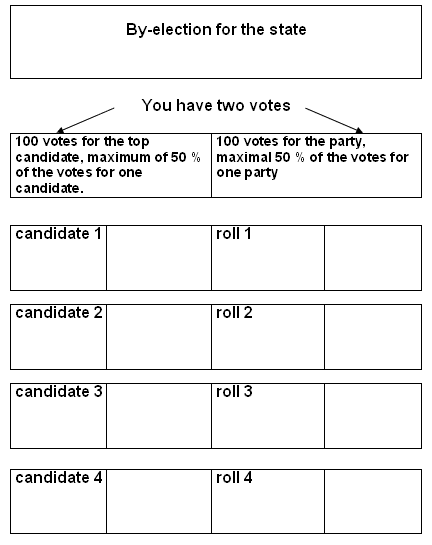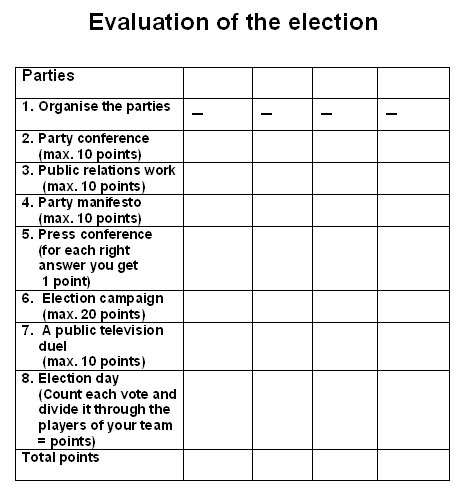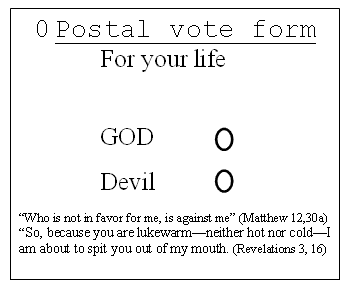source: www.youthwork-practice.com | 2000 Games, Devotions, Themes, Ideas and more for Youth Work
only for private using
Election Day
Introduction to the game
Elections are pending. Different parties apply for the position; they present their election manifesto and hold a press conference. At this evening the public audience pays attention on the big politics. The kids are requested to form parties, to advertise for their party and to develop an election manifesto.
The ensuing event is the election. Which party has the best election manifesto, the best election posters, the best slogans and the best arguments? This will become with the election results.
-
Organization of the parties (pack of scat cards) no points
The participants get a pack of scat cards. Depending on the size of the group you should use 3-4 different colours or pictures to decide on the groups.
-
Party conference: Decide for a name, develop a slogan and elect candidates
(template) The parties have to discuss about the things mentioned above. They get a sheet of paper where they note the name, the abbreviation, the colour, the slogan and the candidates.
-
Public relations work: Design a poster for the election
(DIN A3, collared pencils, rubbers, rulers, etc) (maximum of ten points) Design a poster as advertisement. (Important information on the poster: name, abbreviation, slogan, colour and candidates)
-
Party manifesto:
Express your opinion on youth, family, education, unemployment, pension and choose an own topic (maximum of ten points)
-
Discuss the questions and tackle the topics.
Formulate principles relating to the topics and present them.
-
Press conference: Yes/No game
(One point for each answer)
-
The public television duel: Answer on tricky questions
(party manifesto)
(Maximum of 10 points)
A presenter tries to put questions to you and your party manifesto. Are you completely convinced of your manifesto or are you ready to change your opinion and switch your position? -
Election day: The voting and the decision (template)
It is time for the election. Each participant has to go to the polls. Which party has convinced the audience? You are allowed to allocate 100 points to the candidates or to the party. But there is a maximum of 50 votes for one party/candidate.
-
Coalition and acceptance speech
Hold coalition negotiations if necessary. The acceptance speech gives information about the coalition partner of the winning party. In the speech, the winning candidate also thanks the audience for their votes.
Evaluation of the votes:
For each round, you get points for originality and the ability to convince the audience. You add these points to the election result. Winner is one with the most points.
Party conference
| Name of the party : | |
| Abbreviation of the party : | |
| The colour of the party : | |
| The slogan of the party : | |
| The chosen candidate of the party: | |
| Curriculum vitae of the candidate: - | |
| Authorised to take the position/office by: | |
Party manifesto: their opinions on … |
|
| Youth: | |
| Family: | |
| Education: | |
| Unemployment: | |
| Pension: | |
| Their own topic: | |
Press conference: (Yes/No- Game)
-
Are people allowed to smoke in restaurants in ….. (your country)? No
-
Is the Lower House of Parliament elected every five years? No
-
Is it true that the Lower House of Parliament elects the President of the Federal Republic of Germany? No (The Federal Assembly: one part consists of the Lower House of Parliament and the other consists of the Federal State Parliament.
-
Is it possible that a party can have a seat in the parliament even if this party has not exceeded the 5% hurdle? –Yes (with a direct election of a candidate in a ward)
-
Was Gustav Heinemann a chancellor? No (He was President of the Federal Republic of Germany)
-
Is it true that the federal state parliament decides on the education policy? Yes
-
Is a coalition a union of parties to one big party? No (It is an alliance of convenience for the government)
-
Has each federal state the same number of seats at the Upper House of Parliament irrespective of its size? Yes, each state has 6 seats.
-
Is a citizen who has begun his/hers eighteenth year of life allowed to elect? No (after his/her eighteenth year of life he/she is allowed to elect.)
-
Is Horst Köhler the President of the Federal Republic of Germany (year 2009)? Yes



Election devotion:
Every single day we have to make decisions in favour or against God. We express our opinion in simple every day situations.

Autor:Thorsten Schmidt Germany
[ © www.youthwork-practice.com | 2000 Games and Ideas for Youth Work ]






